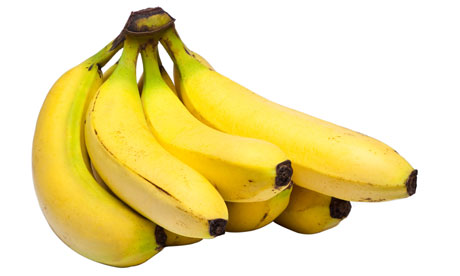
If you want to reduce your risk of having a stroke, you might want to cut down on salt. But would you think about how much potassium you're eating? A series of studies in the BMJ show that reducing salt to 3g a day and increasing potassium-rich foods – fruit and vegetables are good sources – would help to prevent strokes by reducing high blood pressure. So should you ditch the crisps and grab a banana instead?
The solution
Potassium is a chemical that is essential for cells to work properly. It's particularly important in nerve and muscle cells but it is also essential to help keep the body's fluid balance in a steady state.
Low levels of potassium in the blood can cause weakness and muscle cramps. It is rare to get these problems from eating too little potassium; usually they're caused by medical conditions that make us lose potassium, through diarrhoea, kidney failure or excessive sweating.
But that's not to say that eating enough wouldn't have benefits. Hundreds of years ago we had diets that were rich in potassium and we would consume about 200mmol a day. This study suggests that many don't eat the government's recommended 90mmol a day.
Some countries, the USA and Canada included, advocate 120mmol a day. As the amount of processed food we eat has risen and we consume fewer fruits and vegetables, so the amount of potassium we eat has fallen.
The BMJ research, which specifically looked at the effects of potassium on heart disease and stroke, suggests that a higher intake of potassium could cut the risk of stroke by 24%.
This was found by adding up the results from nine observational studies, which, because they don't involve randomising people to get more or less potassium, can only show an association rather than cause and effect. The authors also found a small reduction in blood pressure in people who had more potassium.
Overall, the authors conclude that increasing how much potassium we eat could be beneficial. But here's the huge health warning: people with kidney problems should not increase their intake as they can't get rid of any excess, and high levels of potassium can cause abnormal heart rhythms.
Eating the UK recommended amount was enough to get the health improvements, and eating more than 120mmol per day did not show any additional benefits.
Bananas are the best known high-potassium food, containing 24mmol, but avocados have nearly twice as much. Other sources include yoghurt, milk, nuts, broccoli, peas, red meat, chicken and fish. So there is no excuse – unless you've been told to restrict your potassium for medical reasons, in which case, keep doing so.
Find out more
BMJ: Effect of increased potassium intake on cardiovascular risk factors and disease

